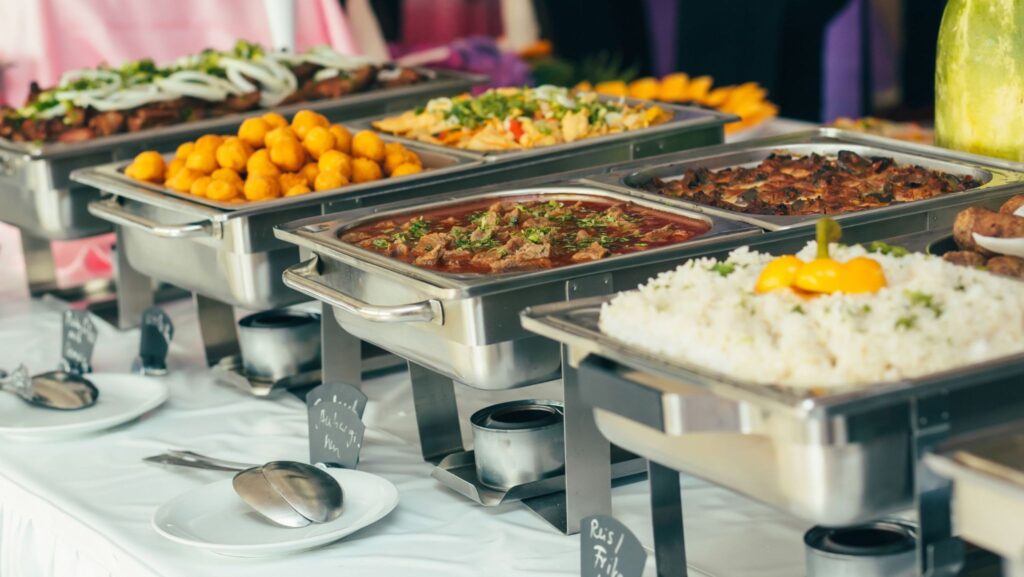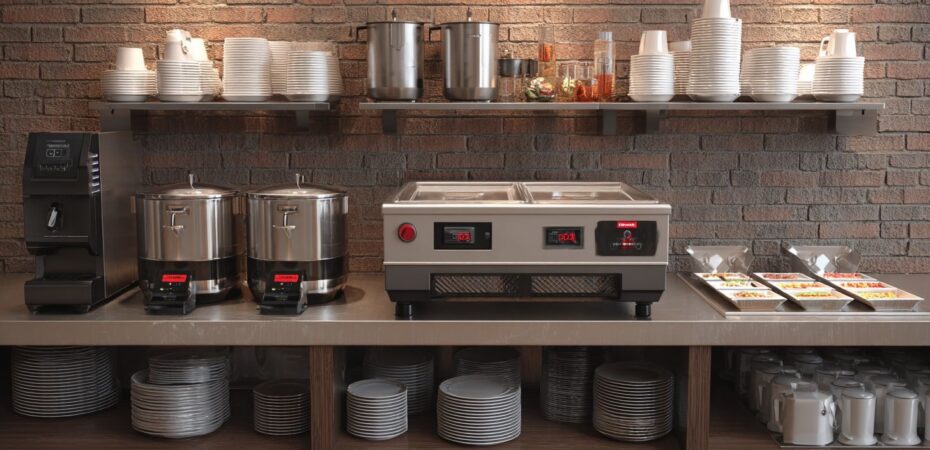Dubai achieved an unprecedented tourism milestone in 2024, welcoming 18.72 million international overnight visitors. This surge, combined with explosive luxury hospitality expansion, fundamentally transforms the requirements for professional kitchen infrastructure. The UAE foodservice market now demands equipment capable of meeting elevated service standards, intensive operational demands, and the sophisticated expectations of global fine dining establishments.
Dubai 2024-2025: A Historic Tourism Record
According to the Dubai Department of Economy and Tourism (February 2025), Dubai welcomed 18.72 million international overnight visitors in 2024, marking a 9% increase over the previous year’s 17.15 million. This record-breaking performance positions Dubai firmly within the world’s premier tourism destinations.
The UAE hospitality market reached USD 23.9 billion in 2024, as reported by IMARC Group. Projections indicate growth to USD 37.7 billion by 2033, exhibiting a CAGR of 5.2% during 2025-2033. This sustained expansion reflects strategic infrastructure investments and the emirate’s successful positioning as a global business and leisure hub.
Dubai International Airport handled 92.3 million passengers in 2024, according to multiple industry reports from February 2025. Western Europe represented the largest source market at 20% of total visitors, followed by South Asia at 17%, demonstrating Dubai’s appeal across diverse international demographics.
The hospitality sector’s growth directly impacts catering equipment demand. Hotels registered an average occupancy rate of 78.2% in 2024, with occupied room nights reaching 43.03 million. This consistent demand translates into sustained requirements for durable, high-performance commercial kitchen solutions.
The Explosion of Full-Service Restaurants and Luxury Hospitality
The UAE full-service restaurant market reached USD 9.92 billion in 2025, according to Mordor Intelligence (January 2025). Projections estimate growth to USD 23.47 billion by 2030, representing a CAGR of 18.79% during the forecast period.
The lodging segment demonstrates the most dynamic growth trajectory. Mordor Intelligence projects approximately 22% CAGR during 2024-2029 for lodging-based full-service restaurants. This exceptional growth reflects Dubai’s strategic hotel expansion, with luxury properties accounting for nearly 70% of new supply.
Cavendish Maxwell reported in April 2025 that total new hotel supply for 2025 comprises 4,619 rooms across 20 hotels. The luxury segment dominates with 1,685 rooms across 8 hotels, representing 36% of new supply. This concentration reinforces Dubai’s positioning in the premium hospitality segment.
Additionally, luxury supply expansion continues through 2026. Cavendish Maxwell projects 11 new luxury hotel openings adding approximately 3,141 rooms, constituting 59% of 2026’s new supply. These high-end establishments require sophisticated restaurant equipment installations capable of supporting refined culinary programs.
Dubai’s hotel inventory reached 154,016 rooms across 832 establishments by December 2024, according to industry data compiled in February 2025. Notable luxury openings included One&Only One Za’abeel, The Lana Dorchester Collection, and SIRO One Za’abeel, each featuring extensive food and beverage facilities demanding premium equipment specifications.
Redefined Quality and Efficiency Standards
Dubai’s gastronomy sector achieved remarkable recognition in 2024. The Michelin Guide Dubai 2024, unveiled in July, recognized 106 restaurants across 35 cuisine types, including four two-star establishments and fifteen one-star restaurants. This represents substantial growth from the guide’s 2022 debut with 69 restaurants.
The emirate hosts 80% of the UAE’s fine dining establishments, according to restaurant statistics compiled in June 2025. This concentration creates intense competition, driving establishments to invest in superior equipment that delivers consistent quality under intensive service conditions.
Over 55% of tourists surveyed rank Dubai as a premier global gastronomy destination, reflecting the city’s culinary reputation. This perception places significant pressure on professional kitchens to maintain impeccable standards through every service period.
Tourism-driven demand intensifies equipment requirements. Restaurants serving international visitors must accommodate diverse culinary traditions while maintaining rapid service speeds. This necessitates versatile, reliable commercial cooking solutions capable of handling multiple cuisines efficiently.
Dubai’s restaurant density ranking—second globally according to the Dubai Gastronomy Industry Report—creates operational challenges. With over 13,000 restaurants serving approximately 3.8 million residents, establishments compete intensely for customer loyalty. Superior equipment performance becomes a critical operational differentiator.
The Technology and Sustainability Imperative

The UAE foodservice market incorporates advanced technological solutions to enhance operational efficiency. According to IMARC Group’s 2024 analysis, restaurants increasingly adopt AI-driven personalization, automated kitchen systems, and integrated ordering platforms to streamline operations and improve customer experiences.
Online food delivery valued at USD 720.7 million in 2024 demonstrates the sector’s digital transformation, as reported in June 2025. Projections indicate growth to USD 1.8 billion by 2033 at a 10.2% CAGR. This delivery-focused model requires equipment configurations optimized for rapid preparation and consistent output quality.
Cloud kitchens, while representing only 1.05% of UAE foodservice establishments, project 5.8% CAGR growth according to Mordor Intelligence. These delivery-only operations demand space-efficient, high-output equipment capable of supporting multiple virtual brands simultaneously.
Sustainability initiatives gain prominence across Dubai’s hospitality sector. The UAE Food Innovation Hub and Abu Dhabi’s Food & Beverage Sustainability Guidelines promote circular practices, local sourcing, and waste reduction. Equipment manufacturers must respond with energy-efficient, environmentally responsible solutions.
The POS terminal market in the UAE projects 6.5% CAGR through 2028, signaling increased operational digitization. Modern kitchens integrate equipment with management systems, enabling real-time monitoring, predictive maintenance, and performance optimization.
European Equipment Manufacturers Facing Emirati Luxury Requirements
The luxury hospitality sector expansion in Dubai creates substantial opportunities for premium equipment suppliers. High-end hotels and fine dining restaurants prioritize quality, reliability, and manufacturing heritage when selecting kitchen installations.
The company Roller Grill, with its expertise in French manufacturing since 1947, illustrates the type of partner sought by Dubai’s premium establishments. Its catering equipment solutions—including professional rotisseries, hot display cases, and buffet equipment—align with the elevated standards demanded by the Emirati luxury hospitality sector.
French manufacturing quality resonates with Dubai’s premium positioning. Hotels and restaurants investing millions in property development seek equipment suppliers with comparable commitment to excellence. This firm demonstrates how European manufacturing heritage becomes essential in Dubai’s competitive fine dining landscape.
Dubai’s full-service restaurant market prioritizes operational reliability. Equipment failures during peak service periods directly impact revenue and reputation. Established manufacturers with proven track records in intensive-use environments offer the dependability premium establishments require.
The lodging segment’s 22% projected CAGR creates sustained demand for comprehensive kitchen equipment packages. New luxury hotel openings require complete installations spanning cooking, refrigeration, display, and service equipment. Suppliers offering integrated solutions with consistent quality standards gain competitive advantages.
QSR and Cloud Kitchens: Complementary Growth
While luxury dining drives premium equipment demand, the quick-service restaurant segment demonstrates robust parallel growth. QSR market value projects growth from USD 5.25 billion in 2024 to USD 25.36 billion by 2033, according to research cited in June 2025.
Tourist arrivals fuel QSR expansion. Visitors seeking convenient, familiar dining options support international chain growth. Dubai hosts approximately 162 McDonald’s outlets, 30 KFC locations, and 80 Burger King establishments across the UAE, with heavy concentration in Dubai.
Cloud kitchen operations expand despite small current market share. These delivery-focused businesses require compact, efficient equipment configurations. Multi-brand operations within single facilities demand versatile cooking solutions capable of producing diverse menu items simultaneously.
The cafe and bar segment, comprising over 3,200 coffee shops and 2,600 cafeterias in Dubai as of 2022, creates demand for specialized equipment. Espresso machines, display cases, and food preparation tools must withstand intensive daily use while maintaining consistent output quality.
Mall culture significantly influences foodservice development. Dubai features over 65 malls, creating high-density restaurant clusters. These locations experience sustained foot traffic, requiring equipment capable of handling continuous operation across extended daily service periods.
2025-2030 Outlook: An Expanding Premium Market
Dubai’s hotel development pipeline ensures sustained equipment demand through the forecast period. Cavendish Maxwell projects over 11,300 new hotel rooms opening by 2027, with luxury and upper upscale segments maintaining dominance.
Hotel inventory growth of 3.1% in 2025 and 3.4% in 2026 generates consistent equipment procurement requirements. Each new property requires comprehensive kitchen installations, creating predictable demand cycles for commercial equipment suppliers.
Major infrastructure developments enhance Dubai’s tourism capacity. The Al Maktoum International Airport expansion and Dubai Metro extensions improve accessibility, supporting continued visitor growth. Enhanced connectivity enables hotels and restaurants to plan capacity expansions confidently.
The UAE foodservice market’s projected growth from USD 16.58 billion in 2024 to USD 50.21 billion by 2033—a 12.20% CAGR according to IMARC Group—reflects broad-based sector expansion. This growth encompasses luxury fine dining, casual restaurants, QSR operations, and delivery-focused concepts.
Dubai Economic Agenda D33 targets positioning among the world’s top three tourism destinations. This strategic vision ensures continued government support for hospitality infrastructure development, creating a favorable environment for sustained equipment market growth.
Tourism’s contribution to UAE GDP reached AED 236 billion in 2024, up from AED 220 billion in 2023, representing 12% of national GDP. This economic significance ensures continued investment in hospitality facilities, maintaining robust demand for professional kitchen solutions throughout the forecast period.


 By
By 




